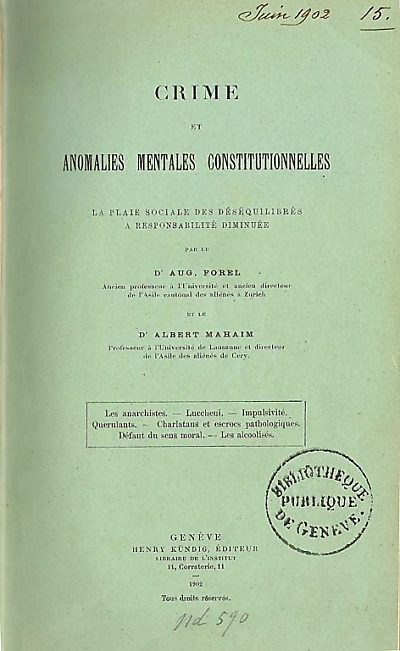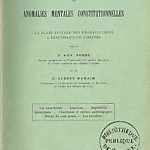When psychiatrists advocated the administrative detention of alcoholics
 Forel, Auguste; Mahaim, Albert: Crime et anomalies mentales constitutionnelles. La plaie sociale des déséquilibrés à responsabilité diminuée, Genève, Kündig, 1902
Forel, Auguste; Mahaim, Albert: Crime et anomalies mentales constitutionnelles. La plaie sociale des déséquilibrés à responsabilité diminuée, Genève, Kündig, 1902 Context
Beginning at the end of the 19th century, a number of cantons in Switzerland passed legislation to deal specifically with the problem of alcoholism, thus aligning themselves with a movement then widespread throughout the countries of the Western world, which saw drinking as a public health and social «scourge». In addition to prescribing various fiscal and administrative measures for regulating the production and distribution of alcoholic beverages, most cantonal laws also included inhibitory provisions aimed at those termed by the law as «drunkards» or «habitual drinkers».
Certain cantons, such as Thurgau and Vaud, sought in this connection the advice of experts to help with the formulation of prophylactic measures for dealing with alcoholics. Thus, for example, the drafters of the Law of the Canton of Vaud of 27 November 1906 on the Detention of Alcoholics refer expressly to a monograph entitled «Crime et anomalies mentales constitutionnelles» (1902), by psychiatrists Auguste Forel (1848-1931) and Albert Mahaim (1867-1925); the intention of the lawmakers is to apply the principles set forth in that work.
Content
As a specialist in brain anatomy, educated at the Universities of Zurich, Vienna and Munich, professor of psychiatry, and director of the cantonal mental asylum in Burghölzli (Zürich), Auguste Forel established himself as one of the leading theoreticians and practitioners in the fight against alcoholism in Switzerland in the late 19th and early 20th centuries. In that role he was involved, notably, in the founding of an asylum for drinkers in Ellikon, on the Thur River, in 1888.
Forel was an advocate of «racial hygiene», an outgrowth of the concept of the «born criminal» as developed by Cesare Lombroso (1835-1909) in his theory of criminal anthropology. In Forel’s view, there exist «constitutional mental anomalies» or congenital and hereditary «stains», which are at the root of numerous crimes.
In their 1902 monograph, August Forel and Albert Mahaim, directing physician at the mental asylum of Cery (Vaud), contributed to the construction of a scientific characterisation of «the alcoholic» – a personality type considered at the time as a «social plague», a danger to his family, to his social environment, and to the «race» that it engenders. Defending the use of administrative detention, Forel and Mahaim advocate the imposition of a regime of abstinence for the «voluntary or involuntary treatment» of all «drunkards» considered to be curable, similar to the treatment reserved for the «mentally insane»; for «psychopathic alcoholics», who were considered to be incurable, they recommend the imposition of restrictions on their freedom of movement, including detention in separate and appropriately equipped asylums, the appointment of a guardian, and police surveillance. At the same time, however, in order to avoid the identification of such forms of institutionalisation with criminal sentences, they specify that the detention of alcoholics must be of a «purely administrative» nature, serving the «health of the public and the individual».
Methodology
First and foremost, the source reflects the state of contemporary knowledge and the nature of the solutions proposed for fighting alcoholism, as propounded by psychiatrists considered as authorities in Switzerland in the early 20th century. Nevertheless, although the drafters of the Law of the Canton of Vaud of 27 November 1906 on the Detention of Alcoholics themselves claim that they were influenced by the works of Forel and Mahaim, it is necessary to investigate the extent to which the lawmakers were, in actual fact, motivated by those psychiatric theories and how they understood them. In the present case, this requires a careful investigation of how the statutory provisions enacted compare with the specific recommendations set forth in the monograph «Crime et anomalies mentales constitutionnelles».
At a more general level, this example illustrates the need to consider the relationship between scientific knowledge and political legitimacy: that is, the requirement for historians to methodically verify the authenticity, the validity, and the use made of scientific theories for the endorsement of political objectives.
L. Maugué/Translation
Source
Forel, Auguste; Mahaim, Albert: Crime et anomalies mentales constitutionnelles. La plaie sociale des déséquilibrés à responsabilité diminuée, Genève, Kündig, 1902.
 previous source
previous source
 next source
next source


